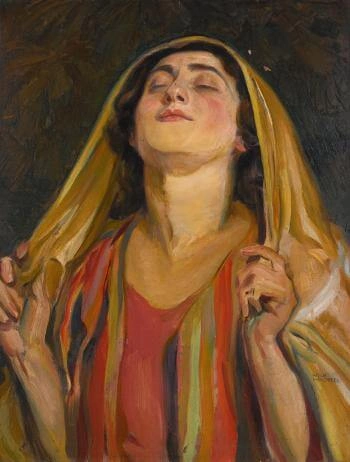1
ανθρωπος ην εξ αρμαθαιμ σιφα εξ ορους εφραιμ και ονομα αυτω ελκανα υιος ιερεμεηλ υιου ηλιου υιου θοκε εν νασιβ εφραιμ
2
και τουτω δυο γυναικες ονομα τη μια αννα και ονομα τη δευτερα φεννανα και ην τη φεννανα παιδια και τη αννα ουκ ην παιδιον
3
και ανεβαινεν ο ανθρωπος εξ ημερων εις ημερας εκ πολεως αυτου εξ αρμαθαιμ προσκυνειν και θυειν τω κυριω θεω σαβαωθ εις σηλω και εκει ηλι και οι δυο υιοι αυτου οφνι και φινεες ιερεις του κυριου
4
και εγενηθη ημερα και εθυσεν ελκανα και εδωκεν τη φεννανα γυναικι αυτου και τοις υιοις αυτης και ταις θυγατρασιν αυτης μεριδας
5
και τη αννα εδωκεν μεριδα μιαν οτι ουκ ην αυτη παιδιον πλην οτι την ανναν ηγαπα ελκανα υπερ ταυτην και κυριος απεκλεισεν τα περι την μητραν αυτης
6
οτι ουκ εδωκεν αυτη κυριος παιδιον κατα την θλιψιν αυτης και κατα την αθυμιαν της θλιψεως αυτης και ηθυμει δια τουτο οτι συνεκλεισεν κυριος τα περι την μητραν αυτης του μη δουναι αυτη παιδιον
7
ουτως εποιει ενιαυτον κατ' ενιαυτον εν τω αναβαινειν αυτην εις οικον κυριου και ηθυμει και εκλαιεν και ουκ ησθιεν
8
και ειπεν αυτη ελκανα ο ανηρ αυτης αννα και ειπεν αυτω ιδου εγω κυριε και ειπεν αυτη τι εστιν σοι οτι κλαιεις και ινα τι ουκ εσθιεις και ινα τι τυπτει σε η καρδια σου ουκ αγαθος εγω σοι υπερ δεκα τεκνα
9
και ανεστη αννα μετα το φαγειν αυτους εν σηλω και κατεστη ενωπιον κυριου και ηλι ο ιερευς εκαθητο επι του διφρου επι των φλιων ναου κυριου
10
και αυτη κατωδυνος ψυχη και προσηυξατο προς κυριον και κλαιουσα εκλαυσεν
11
και ηυξατο ευχην κυριω λεγουσα αδωναι κυριε ελωαι σαβαωθ εαν επιβλεπων επιβλεψης επι την ταπεινωσιν της δουλης σου και μνησθης μου και δως τη δουλη σου σπερμα ανδρων και δωσω αυτον ενωπιον σου δοτον εως ημερας θανατου αυτου και οινον και μεθυσμα ου πιεται και σιδηρος ουκ αναβησεται επι την κεφαλην αυτου
12
και εγενηθη οτε επληθυνεν προσευχομενη ενωπιον κυριου και ηλι ο ιερευς εφυλαξεν το στομα αυτης
13
και αυτη ελαλει εν τη καρδια αυτης και τα χειλη αυτης εκινειτο και φωνη αυτης ουκ ηκουετο και ελογισατο αυτην ηλι εις μεθυουσαν
14
και ειπεν αυτη το παιδαριον ηλι εως ποτε μεθυσθηση περιελου τον οινον σου και πορευου εκ προσωπου κυριου
15
και απεκριθη αννα και ειπεν ουχι κυριε γυνη η σκληρα ημερα εγω ειμι και οινον και μεθυσμα ου πεπωκα και εκχεω την ψυχην μου ενωπιον κυριου
16
μη δως την δουλην σου εις θυγατερα λοιμην οτι εκ πληθους αδολεσχιας μου εκτετακα εως νυν
17
και απεκριθη ηλι και ειπεν αυτη πορευου εις ειρηνην ο θεος ισραηλ δωη σοι παν αιτημα σου ο ητησω παρ' αυτου
18
και ειπεν ευρεν η δουλη σου χαριν εν οφθαλμοις σου και επορευθη η γυνη εις την οδον αυτης και εισηλθεν εις το καταλυμα αυτης και εφαγεν μετα του ανδρος αυτης και επιεν και το προσωπον αυτης ου συνεπεσεν ετι
19
και ορθριζουσιν το πρωι και προσκυνουσιν τω κυριω και πορευονται την οδον αυτων και εισηλθεν ελκανα εις τον οικον αυτου αρμαθαιμ και εγνω την ανναν γυναικα αυτου και εμνησθη αυτης κυριος
20
και συνελαβεν και εγενηθη τω καιρω των ημερων και ετεκεν υιον και εκαλεσεν το ονομα αυτου σαμουηλ και ειπεν οτι παρα κυριου θεου σαβαωθ ητησαμην αυτον
21
και ανεβη ο ανθρωπος ελκανα και πας ο οικος αυτου θυσαι εν σηλωμ την θυσιαν των ημερων και τας ευχας αυτου και πασας τας δεκατας της γης αυτου
22
και αννα ουκ ανεβη μετ' αυτου οτι ειπεν τω ανδρι αυτης εως του αναβηναι το παιδαριον εαν απογαλακτισω αυτο και οφθησεται τω προσωπω κυριου και καθησεται εκει εως αιωνος
23
και ειπεν αυτη ελκανα ο ανηρ αυτης ποιει το αγαθον εν οφθαλμοις σου καθου εως αν απογαλακτισης αυτο αλλα στησαι κυριος το εξελθον εκ του στοματος σου και εκαθισεν η γυνη και εθηλασεν τον υιον αυτης εως αν απογαλακτιση αυτον
24
και ανεβη μετ' αυτου εις σηλωμ εν μοσχω τριετιζοντι και αρτοις και οιφι σεμιδαλεως και νεβελ οινου και εισηλθεν εις οικον κυριου εν σηλωμ και το παιδαριον μετ' αυτων
25
και προσηγαγον ενωπιον κυριου και εσφαξεν ο πατηρ αυτου την θυσιαν ην εποιει εξ ημερων εις ημερας τω κυριω και προσηγαγεν το παιδαριον και εσφαξεν τον μοσχον και προσηγαγεν αννα η μητηρ του παιδαριου προς ηλι
26
και ειπεν εν εμοι κυριε ζη η ψυχη σου εγω η γυνη η καταστασα ενωπιον σου εν τω προσευξασθαι προς κυριον
27
υπερ του παιδαριου τουτου προσηυξαμην και εδωκεν μοι κυριος το αιτημα μου ο ητησαμην παρ' αυτου
28
καγω κιχρω αυτον τω κυριω πασας τας ημερας ας ζη αυτος χρησιν τω κυριω







